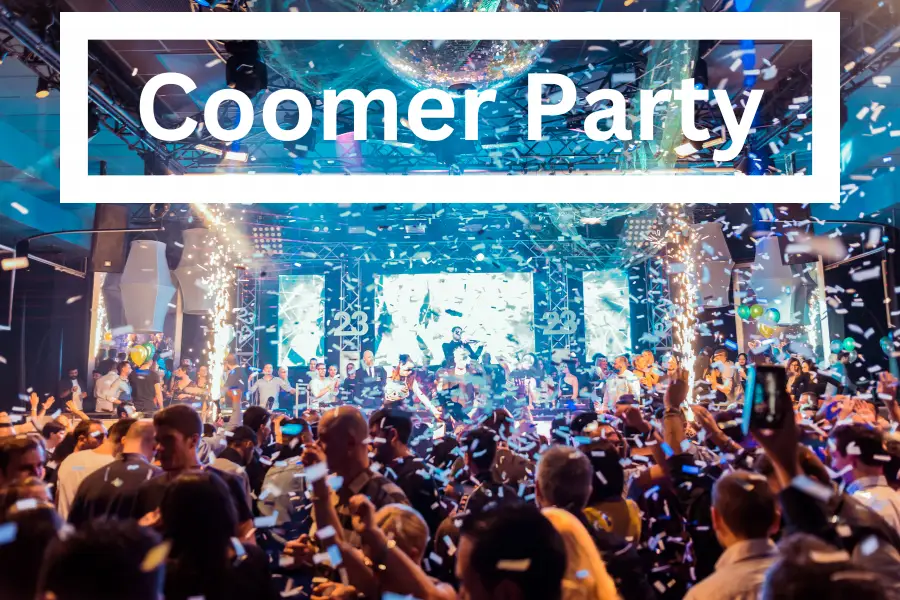In recent years, internet culture has birthed a variety of subcultures and phenomena, each contributing to the ever-evolving landscape of online interaction. One such phenomenon is the Coomer Party, a term that has sparked curiosity and debate within various online communities. This article delves into the origins, definition, and impact of the Coomer Party, exploring its role in social media and culture.
Table of Contents
Origins and Meaning
Coomer Party is derived from internet slang, specifically a meme that emerged from online forums and image boards. It combines the words coom (a colloquial term for ejaculation) and “loser,” creating a term that describes a person who is excessively focused on or consumed by adult content.
The Coomer Party is a social phenomenon associated with this meme, often represented as individuals who identify with or embrace the Coomer archetype. This subculture is characterized by its humorous, self-deprecating attitude and its focus on embracing and celebrating this particular internet persona.
Defining the Coomer Party?
The Coomer Party can be understood as a meme and a social group. On one hand, it represents a satirical and exaggerated portrayal of internet users who are perceived as overly obsessed with adult content. On the other hand, it has evolved into a community that often uses humor and memes to address internet culture and personal identity issues.
Impact on Social Media and Culture
Influence on Social Media
The Coomer Party has notably impacted social media platforms, particularly within meme communities and forums like Reedit, 4chan, and Twitter. The meme has been widely shared and is often used humorously critiquing or commenting on internet culture. Its popularity indicates how memes can influence and shape online discourse, creating communities around shared jokes and references.
Cultural Significance
Culturally, the Coomer Party reflects broader trends in internet culture, including the co modification of online personas and the blending of humor with social commentary. It highlights how internet subcultures can form around niche interests and how these groups use humor as a coping mechanism for navigating digital life. The Coomer Party also illustrates how memes can evolve from simple jokes into significant cultural symbols.
Formation of Online Communities
The Coomer Party has contributed to forming online communities that bond over shared humor and cultural references. These communities can provide a sense of belonging and identity for individuals who feel aligned with the Coomer persona. They also serve as a platform for users to explore and express their views on Internet culture and related topics.
Influence on Meme Culture
The popularity of the Coomer Party underscores the influence of memes in shaping online discourse. Memes like this can quickly gain traction and spread across various platforms, affecting how people communicate and interact online. The Coomer Party exemplifies how memes can become significant cultural symbols and influence broader conversations.
Effect of Common Party
Perpetuation of Negative Stereotypes
Critics argue that the Coomer Party perpetuates negative stereotypes about individuals who consume adult content. The meme can reinforce harmful judgments and stigmas by framing these individuals as socially inept or excessively focused on adult material. This portrayal may contribute to broader societal issues related to the shaming and marginalization of certain behaviors.
Impact on Mental Health
The Coomer Party might also have implications for mental health. The exaggerated, self-deprecating nature of the meme could contribute to feelings of shame or inadequacy among individuals who identify with the Coomer archetype. Instead of fostering a supportive community, it might reinforce negative self-perceptions and exacerbate existing mental health challenges.
Misinterpretation and Misuse
The meme’s satirical nature can sometimes lead to misinterpretation or misuse. Some users might adopt the Coomer persona in a way that exaggerates or distorts its original meaning, potentially leading to confusion or the spread of misinformation. Additionally, those outside the community might need to understand the meme’s humor, leading to unintended consequences.
Food Culture in Coomer Party
Memes and Food
In internet culture, memes often incorporate various elements, including food, to create humor and relate to shared experiences. The Coomer Party meme may feature food in a satirical or exaggerated manner, reflecting stereotypical behaviors associated with the Coomer persona. For example, memes might depict characters consuming large amounts of fast or junk food, highlighting perceived lifestyle habits.
Dietary Stereotypes
Food experiences in the Coomer Party context might include stereotypical dietary habits associated with the meme. This could involve:
Convenience Foods: Depictions of individuals consuming readily available, inexpensive foods like pizza, ramen, or microwave meals, emphasizing a need for more interest in healthy eating or culinary sophistication.
Excessive Snacking: Imagery of excessive snacking or binge eating, reflecting a humorous exaggeration of the Coomer persona’s lifestyle choices.
Humor and Satire
Food-related content within the Coomer Party meme often uses humor and satire to exaggerate certain behaviors or traits. This can include:
Over-the-Top Meals: Imaginary or exaggerated food creations that play into the meme’s themes of excess and indulgence.
Self-Deprecating Humor: Jokes about poor dietary choices or unhealthy eating habits, used to poke fun at the Coomer stereotype.
Community Rituals and Traditions
Food-related traditions or rituals might emerge as part of the meme culture in some online communities. For example:
Themed Parties or Events: These are online gatherings or themed parties where food plays a role in the celebration, often reflecting the humorous or exaggerated aspects of the Coomer meme.
Food Challenges: Participation in food-related challenges or trends that align with the humor and persona of the Coomer Party.
Impact on Real-World Behavior
While the Coomer Party primarily exists in meme culture, its influence can extend to real-world behaviors. This might include:
Dietary Trends: Individuals adopting or joking about dietary trends associated with the “Coomer” stereotype, such as a preference for fast food or indulgent snacks.
Community Influence: The online community’s shared jokes and cultural references influence food choices and behaviors.
Final Thoughts
The Coomer Party represents an intriguing intersection of meme culture and social commentary. As internet subcultures evolve, phenomena like the Coomer Party provide insight into how digital communities form and influence contemporary culture. Whether viewed as a humorous meme or a reflection of deeper social trends, the Coomer Party highlights the dynamic nature of online interactions.
FAQs
What is the origin of the term Coomer?
The term Coomer originated from internet slang, combining coom (a colloquial term for ejaculation) with “loser.” It initially emerged on image boards and forums to describe individuals excessively focused on adult content.
How did the Coomer Party become popular?
The Coomer Party gained popularity through meme communities on social media platforms like Reddit and Twitter. Its humorous and self-deprecating nature resonated with users, leading to widespread sharing and forming a subculture around the meme.
What is the significance of the Coomer Party in internet culture?
The Coomer Party signifies blending humor with social commentary within internet culture. It illustrates how memes can evolve from simple jokes into meaningful cultural symbols, reflecting broader trends and issues in online communities.
How does the Coomer Party impact social media discussions?
The Coomer Party impacts social media by contributing to discussions about internet culture and personal identity. It often serves as a humorous critique of online behaviors and trends, influencing how users interact and engage with digital content.
Is the Coomer Party a positive or negative phenomenon?
The perception of the Coomer Party varies depending on individual perspectives. Some view it as a humorous and self-aware commentary on internet culture, while others may see it as a negative or satirical portrayal of certain online behaviors.

